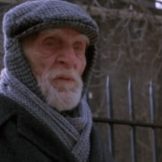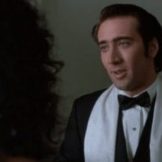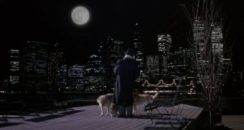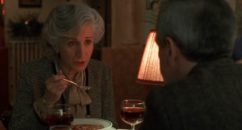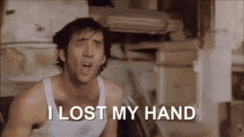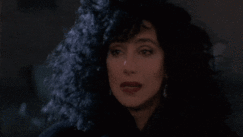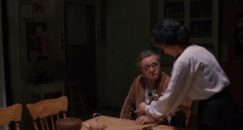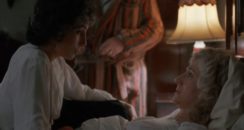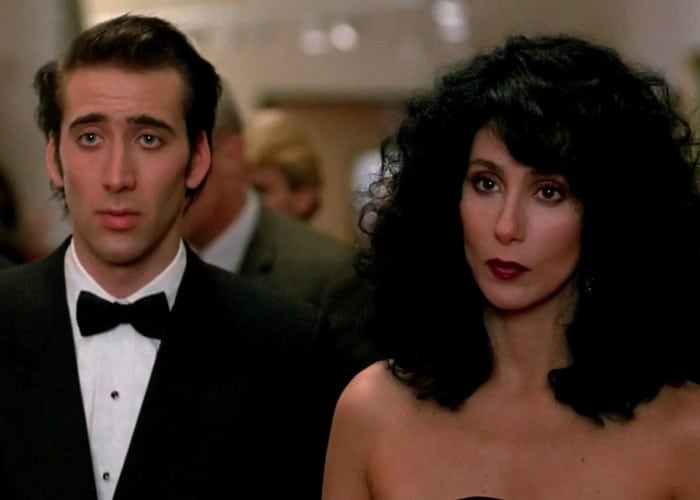
Welcome to Alt-Christmas, our week of articles dedicated to movies that we like to watch this time of year, especially if we’re not entirely in the spirit of the season.
There is a certain class of film that is inextricably (almost exclusively) tied to the holidays by virtue of being, well, about the holidays. But there’s plenty of reasons why a film can feel like a holiday movie. We all celebrate the holidays differently and the films we associate with this time of year reflect that difference. We should celebrate that. Which brings me to the glorious late-80s comfort food that is Moonstruck, which in addition to being one of my favorite films of all time, is a phenomenal holiday movie.
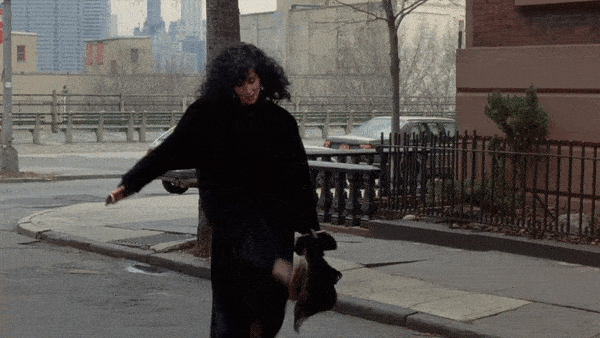
yaaaaaaaas
Moonstruck follows Loretta Castorini (an assured and radiant Cher), a widow from Brooklyn who finds herself in a tough spot when she falls for her fiancé’s estranged, melodramatic younger brother (Nic Cage). Directed by Canadian filmmaker Norman Jewison (In the Heat of the Night), Moonstruck is one of the few romantic comedies to be nominated for Best Picture (it won three Oscars in total, two for Cher and Olympia Dukakis’ performances and one for screenwriter John Patrick Shanley, whose script is proof of the power of truth spoken in plain words).
So, without further ado, put on some Dean Martin (or Puccini if you’re fancy). Here’s why Moonstruck is the holiday classic you never knew you needed.
1. The Winter Looks
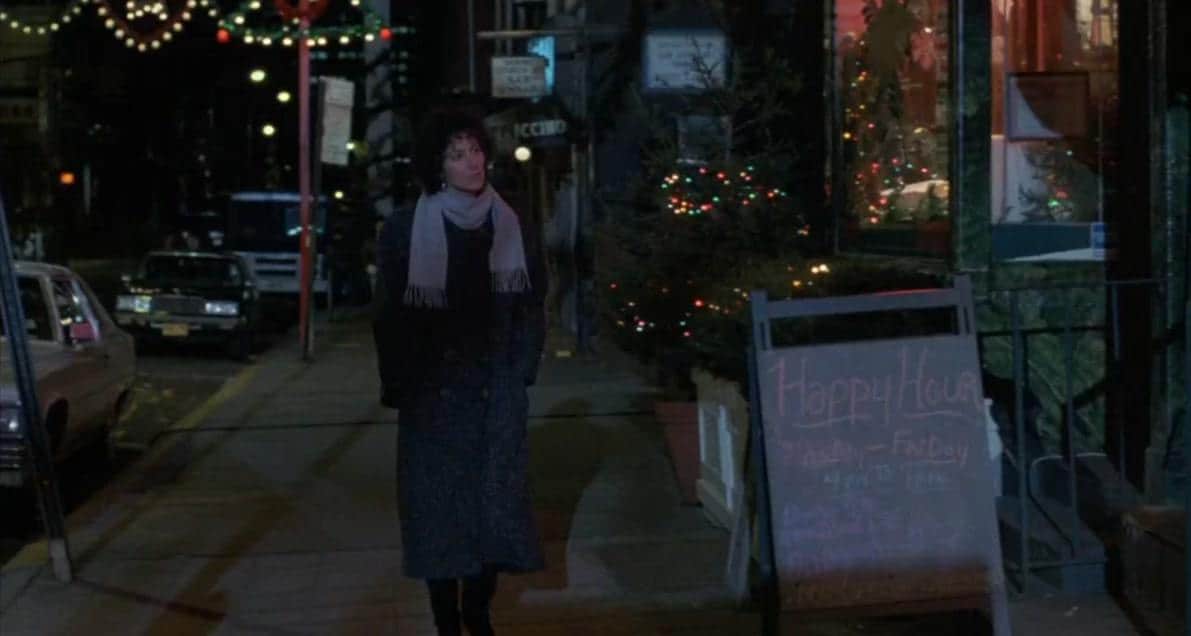
Everyone in this movie is living their best winter apparel life. Cher’s “frumpy chic” outfit is my fashion white whale. Someday, so help me god, I will replicate it and in all its ankle-length, grey-slate glory. Cage’s deep-green plaid jacket with the sherpa collar is also a look (though it has nothing on his opera duds). Hell, even the grandpa (played by the legendary Feodor Chaliapin Jr.) knows how to match monochrome textures while looking snug.
2. The Sense of Cold (and Warmth)
Moonstruck takes place in a fanciful Brooklyn, as real as the scenery flats of La bohème we see being unpacked during the film’s opening credits. Its world feels contained and cozy in the same way a set does. After all, the moon is massive. Big enough to make people fall in love.
Scenes of insight and sublimity are bathed in a cold, lunar spotlight that gives these moments a chilled, supernatural feeling. They’re like the brief glimpse we see of La bohème at the MET; it’s a coldness that feels intentional and ethereal. These otherworldly scenes are set alongside the inviting domesticity of interior spaces, which are all the more welcoming by contrast. They radiate a warmth that is both physical and emotional: there’s the dark cherry of the bed frame in Rose and Cosmo’s room; the inviting, rosy glow of the Grand Ticino’s table lamps; and the deep crimsons of the carpet and curtains at the MET. Moonstruck feels like the crisp walk home after a movie; it feels like the relief of taking off your coat at a packed restaurant.
3. The Emotional Abandon
Winter is, for many reasons, an emotional time of year. Who among us has not figuratively cried over spilled milk during the holidays? Or, to give a definitely not personal example, wept openly in a bodega while listening to “Hard Candy Christmas?”
Moonstruck is, at its core, a big, corny, stylish film about people coming to terms with themselves and the people they love. This willingness to be emotional, both in bombast (“CHRISSY BRING ME THE BIG KNIFE”) and in subtler, gentler ways (“I love him awful”), is one of Moonstruck’s most endearing qualities. Cage’s Ronny Cammareri moves through the world like one of the wounded romantic heroes of his operas, slinging declarations of love and betrayal with the braggadocio of a counter-tenor. He is prickly. He says things like “the past and the future is a joke to me now.” A gust of wind could hit him the wrong way and reduce him to tears. Cher’s emotional journey is more specific, tapping into that special kind of existential upheaval that runs rampant during the holidays when your routine is shaken and you discover new parts of yourself (only to contend with these discoveries January 1st).
There are times where Moonstruck dips into the champagne-filled pool of melodrama but in the end, it always manages to feel grounded. A large part of that has to do with how much Moonstruck loves its characters and refuses to reduce them to punchlines. The meal Rose (Dukakis) shares with Perry (John Mahoney), for instance, is nuanced and insightful. He isn’t just a pervert who sleeps with his students, and she isn’t just a lonely housewife who’s being cheated on. It’s messier than that
4. Because You Fear Death
Not to be dramatic but winter isn’t exactly verdant or life-affirming. Depending on where you live (or how much seasonal depression you slip into), it can be an unforgiving season of hard ground, dead trees, and precipitous existential dread.
When Loretta’s mother discovers that her husband is cheating on her, she asks her daughter’s fiancé why men cheat. He confirms what Rose has suspected throughout the film: that maybe, just maybe, it’s because they fear death. Later, when Cosmo (Vincent Gardenia) comes home late, Rose greets him, coolly: “I just want you to know that no matter what you do, you’re still gonna die. Just like everyone else.”
When Rose asks Perry to join her for dinner, at the end of the night she tells him: “I can’t go home with you because I know who I am.” Rose isn’t needy like Perry and Cosmo (and arguably, Loretta) are. She has an identity, a home, and a family. She’s satisfied. I think we clamor after that satisfaction during the holidays; after that feeling of wholeness and peace with the foundations of our lives.
5. The Resilient Feeling of Family
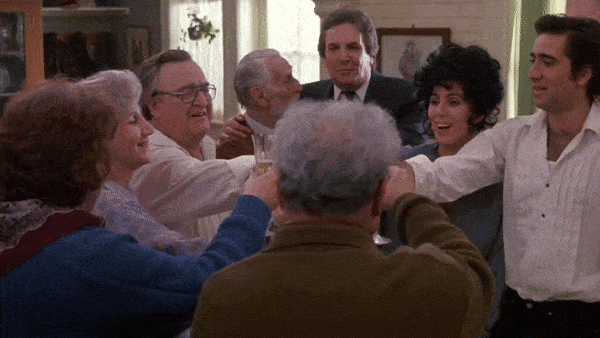
While Moonstruck is absolutely a romance, a lot of the laughs and heartache grow out of a sense of family that feels terribly, terribly real. As homey as those eggs that Rose makes (a movie breakfast, second only to the fry-up from Four Weddings and a Funeral).
There are poignant and hilarious moments that make Moonstruck’s sense of family feel so textured and salient. There’s the way you can hear Cosmo blasting his “damn Vikki Carr record” from outside the brownstone. There’s the simultaneously flippant and charged conversation Loretta and Rose have about selling the house to pay for the wedding. There’s the way the grandpa rebelliously, adamantly feeds his dinner to his pack of dogs.
Moonstruck is peppered with grudges and old wounds, but as Roger Ebert writes: “all of the passion is drained of its potential for hurt, somehow, by the influence of the moon, which has enchanted these people and protects them from the consequences of their frailties.”
Winter is temporary, family is forever.
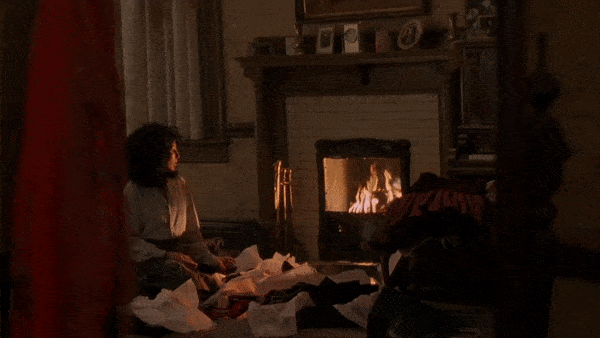
Now go fall in love!
Related Topics: Cher, Christmas, Comedy, list, Moonstruck, Nic Cage


